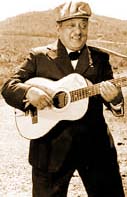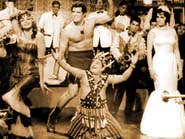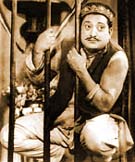Bhagwan - The little big man
http://www.rediff.com/entertai/apr/04bagw.htm
V Gangadhar
Shola jo bhadke, dil mera dhadke...
And if you think the reference here is to Aby Baby alias Amitabh
Bachchan, you've need to have a second thought coming. 'Cause
the AB style of dance is not new - or unique. Bachchan was inspired
into creating his dance style after he watched a short, fat, round
actor move easily, in perfect syncronisation to the music of the
moment.
Bhagwan's style of dance was so effervescent, the audience could
not help following his tune. Be it 1952, 1962 or 1992, the impact
of the songs - especially of Shola jo - from his film Albela
have not changed.
I first saw the film, somewhere in the 1950's, at a theatre in
Fort Cochin. Twenty years later, I saw it again. This time, it
was a morning show at Bombay's Apsara cinema. And, in both theatres,
the reaction was the same. The enthused audience whistled, clapped
its hands, stood on the seats and generally went berserk as the
lively, melodious tunes of Albela filled the hall.
This is one movie that has stood the test of time. To date, its
music is a must at every Indian celebration. And urban youngsters,
who are normally used to gyrating to Michael Jackson, still boogie
enthusiastically to Shola jo bhadke at various discotheques.
Albela was the brainchild of ace comedian-dancer Bhagwan.
In the days when he was a much sought-after member of Hindi filmdom,
Bhagwan would spend a lot of time with his close pal, music director
C Ramachandra. The duo would while away the hours listening to
music or to Chitalkar playing the harmonium. Eventually, it would
be Chitalkar and an up-and-coming Lata Mangeshkar who would record
one of the all-time favourites songs of Hindi cinema - Shola
jo bhadke, dil mera dhadke.
Ramachandra, who was already a famous figure in the film world,
was also a very outspoken person. And he hounded Bhagwan make
a film with a social theme. "I will help you," he promised.
"The world will never be able to forget the music I will
provide for your film." Seated in a restaurant at Churchgate,
they discussed the plot of the film. And decided that the film
would contain at least a dozen memorable songs.
Till then, Bhagwan had just been another filmmaker - the creation
of a wide-eyed child who was fascinated by the magic of silent
cinema. Even though he had his origins in the labour-dominated
areas of Parel and Dadar, even though he did not know where his
next meal was coming from, Bhagwan always managed to scrounge
around for the seven annas that he needed to watch a film
and eat some channa.
Little Bhagwan adored Master Vittal, one of the more popular heroes
of the silent era. Though his movies were mainly stunt-oriented,
Bhagwan was transported into a world of his own, into a world
that was far away from his poverty-infested real world.
Forced to give up studies after the fourth standard, Bhagwan did
a lot of odd jobs. In between, he would work out at the local
gym in order to improve his physique. His aim was clear - he wanted
to join the film industry.
He quickly learnt all the aspects of film-making, even as he continued
to act in a series of stunt film like Bahadur Kisan, Criminal
and so on. Meanwhile, more and more people started expressing
an interest in financing films. There was a demand for directors
and Bhagwan was more than willing to try his hand.
Soon, he was wielding the megaphone for limited-budget films.
"I made films for less than Rs 65,000" he recalls. "These
were the kind of films where the director had to design costumes
and even arrange meals for the unit. But it was worth it."
His film could not be acclaimed as great, but they were profitable
ventures. The period saw a spate of action films, including Bhagwan
Dada's Dosti, Jalan and Bhedi Bangala. Bhagwan was
as popular a star as Fearless Nadia, and the crowds thronged the
theatres for their films. But the trend was changing, a fact that
was pointed out to him by Raj Kapoor. "Dada," he urged,
"zamana badal gaya hai. Social picture banao."
The result was Albela - a film that was in tune with newly
independent India. Both the young and the old loved it. It ran
for more than 50 weeks at the theatres where it was shown. At
some places, the collections even surpassed Raj Kapoor's Barsaat.
It was to join the ranks of Sholay, Mother India
and Ganga Jamuna as a landmark in Hindi cinema.
Albela was a simple, uncomplicated movie. A poor man (Bhagwan)
from an orthodox family dreams of becoming a kalakar. His
family is indifferent to his ambitions, the people who know him
poke fun at his aspirations. Until the day he comes in contact
with a well known female singer, portrayed by the popular Geeta
Bali.
The singer recognises the tremendous talent and never-say-die
spirit of the hero and encourages him. Very soon, they become
a famous singing pair. Romance blossoms between the pair and the
film ends on an all's-well-that-ends-well note.
Unfortunately, he turned out to be a 'one-hit' wonder. He made
Labela and Jhamela. Both films failed miserably
at the box office. With failure came some bitter lessons. His
large circle of friends, who lived at his expense, deserted him.
He was forced to adopt a more austere way of life, to sell his
cars and bungalow.
Everything changed, except his addiction to movies. Initially,
Bhagwan was offered good roles in films like Mister Lambhoo
and Bhagambaag. Soon, though, he only got bit roles. It
became difficult to run the household. But Bhagwan was not worried;
after all, he had been born and brought up in poverty.
Besides, Bhagwan could not adapt himself to the needs of modern-day
Hindi cinema. Nor did he believe in looking back. Nostalgia was
of no use to him. Similarly, he was not worried about the future.
"Jo hoga," he shrugs, "wohi hoga."
Today, there are no bungalows. Or cars. Or close friends. Instead,
the 80-something Bhagwan lives in a chawl in suburban Dadar, Bombay.
His house is poorly furnished. But it is still the same house
where music director Ramachandra, actor Om Prakash, lyricist Rajinder
Krishan and others spent long hours weaving dreams of great movies,
wonderful roles and lilting tunes.
Photographs : Courtesy Kamat Foto Flash
From www.rediff.com
 Just a hint of the tune, and your feet move instantly. In a manner
- the rolling of eyes, the slight jhataks and those little
mataks - that is so typical of the most famous male dancer
in the Hindi film industry.
Just a hint of the tune, and your feet move instantly. In a manner
- the rolling of eyes, the slight jhataks and those little
mataks - that is so typical of the most famous male dancer
in the Hindi film industry.
 Finally, he got his chance in 1930. After years of haunting the
studios in the hope that he would some day be discovered, producer
Siraj Ali Hakim gave him a small role in the silent film, Bewafa
Aashiq. Bhagwan was so thrilled, he refused to leave the studio
even after his work was completed. Nor was he ready to leave the
studio even when it was time to shut down the sets for the day.
Finally, he got his chance in 1930. After years of haunting the
studios in the hope that he would some day be discovered, producer
Siraj Ali Hakim gave him a small role in the silent film, Bewafa
Aashiq. Bhagwan was so thrilled, he refused to leave the studio
even after his work was completed. Nor was he ready to leave the
studio even when it was time to shut down the sets for the day.
 Bhagwan, obviously, was nobody's heart-throb. Portly and slow
moving, he could not compare with the heroes of his day like Raj
Kapoor, Dilip Kumar or Ashok Kumar. But he was ideally cast as
the simpleton who loved music and singing and was determined to
make a mark. The rest was history. The film became a super hit,
Bhagwan had everything he had dreamt of - money, fame, friends,
luxury.
Bhagwan, obviously, was nobody's heart-throb. Portly and slow
moving, he could not compare with the heroes of his day like Raj
Kapoor, Dilip Kumar or Ashok Kumar. But he was ideally cast as
the simpleton who loved music and singing and was determined to
make a mark. The rest was history. The film became a super hit,
Bhagwan had everything he had dreamt of - money, fame, friends,
luxury.